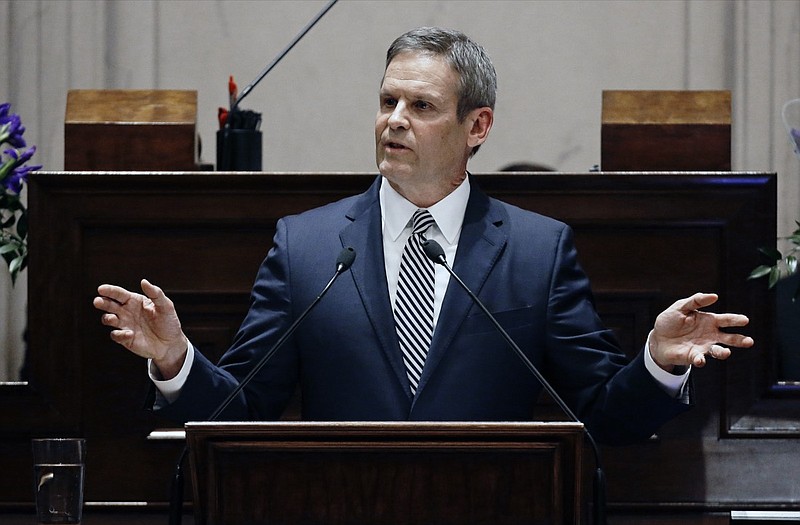NASHVILLE - Brushing aside concerns and criticisms, Gov. Bill Lee said he sticking with a new plan to implement his controversial Tennessee school voucher program in the fall of 2020, a year earlier than expected by lawmakers.
The governor this week defended his decision, noting legislators pared back his administration's Education Savings Account program from five county public school systems to just Nashville and Shelby County, the state's largest.
"What we found was the implementation could occur more efficiently and more effectively in a short time frame," Lee told reporters Thursday, nonetheless insisting he was not "accelerating" the program. "So that's why we're trying to get this done earlier - so kids can get started in the plan."
Hamilton, Knox and Madison-Jackson County school systems were included in his original bill. But they were stripped out as part of multiple efforts to prevent the new Republican governor's effort from dying in the GOP-controlled House.
Even so, the bill deadlocked this spring for 40 minutes in a 49-49 House tie vote, sending the governor, his lobbying team and then-House Speaker Glen Casada scrambling to save it.
That generated a huge controversy after the bill finally passed 50-49. And it also continues to raise ugly questions and charges over what offers were made and deals struck not only on the floor but in committees to get the bill through various tight spots.
Casada officially resigned Friday amid a number of scandals and controversies that erupted during his brief term as the new House speaker even prior to the voucher bill. But his ramrodding of the voucher bill and other actions, however, is widely seen at the Capitol as helping erode his support from some Republicans upset over perceived threats and more.
Earlier this week, Republican Caucus Chairman Cameron Sexton of Rossville, who is the majority GOP lawmakers' speaker nominee to replace Casada in an Aug. 23 special session, told The Tennessean this week he has concerns about accelerating implementation of the voucher program.
"I don't think it needs to be accelerated at this point," said Sexton, who this year opposed Lee's effort to provide an average of $7,300 annually per student for the education savings accounts with money able to go toward private school tuition, private tutoring, uniforms and other needs.
"You know, we'll have those conversations with the governor," Sexton said. " ... I think the [caucus] members are lock step in that, as well in the House."
But he acknowledged the political climate may be different in the GOP-controlled Senate, which has routinely passed school voucher bills in the past, only to see them die in the Republican-led House before this year's effort.
The legislation required the program to start by the 2021-2022 academic year. Many lawmakers assumed that was when it would start and were startled by Lee's push to start it earlier.
But while the House is riled up, it's a different situation in the Senate.
"The legislation passed by the General Assembly gives the administration some discretion as to when the program may start," said Adam Kleinheider, a spokesman for Lt. Gov. and Senate Speaker Randy McNally, R-Oak Ridge.
Kleinheider said that while McNally "is open to working with Speaker-select Sexton and the administration on the best timeline, Lt. Gov. McNally trusts Gov. Lee to roll out the program at the proper pace."
Jim Wrye, chief lobbyist for the Tennessee Education Association for teachers, which opposed the bill, said Lee's effort to move more quickly to get something going shouldn't come as much of a surprise.
"I think the administration with the constant revelations of the corrupt practices that it took to pass the bill would like to get started sooner rather than later," Wyre said, adding "there's a lot of interest in the General Assembly as more and more things come out about whether they'd maybe like to scrap it and start all over."
With "all of this flux and information coming out about what it took to pass it, I think they don't want to wait a year and a half on what it's going to take to plan and create rules to ensure taxpayer dollars are not stolen, misused. And that's an issue," Wrye added.
Controversies over the bill include a Democratic lawmaker, Rep. John Mark Windle of Livingston, who is a lieutenant colonel in the Tennessee National Guard, confirming that as the bill deadlocked on the floor, Casada suggested to him that he could become a National Guard general if he switched his vote.
Windle did not switch his vote. Casada has vehemently denied he ever "promised" Windle a National Guard promotion, noting only a governor can make such a promotion.
Citing Windle's experience, House Democratic Caucus Chairman Mike Stewart of Nashville charged that "both the administration, the governor himself, and Speaker Casada need to give the people straight answers - not this sort of shilly-shallying around that we've seen so far."
Stewart also said "it can only be assumed to represent bribery. And it needs to be fully investigated as a criminal matter."
Speaking with reporters on Thursday, Lee said he made no such promise and that when he spoke by phone with Windle, he only stressed the importance of the bill and what it could do for students stuck in failing public schools.
Wrye, meanwhile, said that by moving more quickly to get "some money flowing" into the voucher program, Lee's goal may be turning it into a "fait accompli," thus making lawmakers repeal it or even change it.
Contact Andy Sher at asher@timesfreepress.com or 615-255-0550. Follow him on Twitter @AndySher1.
